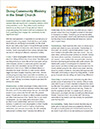Editor’s note: This information adapted from an article by Joy F. Skjegstad which appeared previously in Leading Ideas. This To the Point version has been edited for brevity and is accompanied by a PDF flier that you may download and share with others.
Sometimes I interact with small congregations that assume that any significant community ministry effort is beyond their reach. They often keenly feel their limitations as they work to keep internal church programs going with limited staff and volunteers. So how could they ever engage the community in any significant way?
With the right approach, it is possible for a small group of people to make a big impact. It will take focus and clarity about what you are trying to accomplish, but the small church can make a big impact in the world through partnerships, creative use of resources, and a focus on relational ministry. Small congregations have unique strengths that can result in strong and effective community ministry.
Focus. A small congregation has to be more disciplined about not “biting off more than it can chew.” Identifying just one thing to focus on (tutor kids at the local public school, collect diapers, sponsor a community garden) may well help you be more successful, as you will have clear outcomes in front of you. I think sometimes there is a temptation for larger churches to make ministry efforts bigger and more complex than they need to be. Internal ministry programs may have many bells and whistles, so we think we need to do that with work in our community as well — right? Wrong! Sometimes simpler is just what the community needs.
Relationships. Another advantage of being small is that your church may be better at relational ministry than larger churches, and it is the relationships that you can build with people in your community that will make the greatest impact. People who are drawn to attend smaller churches are often there because of the “family” feel; in your small congregation, you can really get to know each other, go deep in your relationships, and bear one another’s burdens. A pastor of a rural congregation in West Virginia told me that his small church is “a place of gathering, celebration, and common community. We still celebrate each person’s birthday here!” Carrying that affinity for relationship into the community may well help you make a greater impact than if you brought hundreds of volunteers or thousands of dollars. Everything you’ve learned within your own congregation about really listening to one another and devoting time to relationships will bless your community in myriad ways.
Partnerships. Small churches often have no choice but to partner with others to carry out ministry. Partnerships, if done well, can result in exponentially greater impact. You aren’t limited to the gifts within your own church. You can seek others, particularly when working on complex community issues where expertise, connections, and resources are needed. I once worked with several smaller churches that were developing partnerships with public schools. We started with a goal of recruiting just 10 volunteers from each church, and they met that goal. Next people from the church started going into the school every week, learning about the needs of students, interacting with teachers and other staff, and making an impact by being faithful. A small group of people who are willing can make a big difference!
Ownership. In a small church, members may also feel a greater sense of ownership for the ministry. Without many paid staff, it is up to church members to develop the vision and the plan, find partners, and enlist other members to get involved. You can’t just look around and say, “Pastor So-and-So is going to do that.” In a small church, when you look around, you might only see yourself and a few of your friends. If you don’t do it, no one else will! This strong ownership by lay leaders can help ministry be sustainable over the long term.
Accountability. Finally, those in small churches may be better able to hold each other accountable for following through on ministry goals and commitments because you are small. If just a few of you are working on a project and two of you don’t show up, it’s pretty obvious who isn’t holding up their end of the work! It is harder to be anonymous and go back on what you’ve agreed to. It is harder to give up when your friends are on your case!
Small churches are all too aware of the challenges facing their ministries — limited funds, members, and facilities. But even in the face of such challenges, your small church can start some very powerful community ministries. Take stock of what you do have rather than what you don’t have, and build on those assets. Be creative about finding partners, raising money, and securing in-kind donations. And most importantly, keep going. Some of the most successful community ministries are small and focused and don’t require lots of money and people.
Joy F. Skjegstad is a consultant who works helping churches develop programs to meet community needs. She is the author of 7 Creative Models for Community Ministry (Judson Press, 2013) and Starting a Nonprofit at Your Church (Rowman and Littlefield, 2002).
Download a PDF of this page to share with others.
 Help Ensure Your Church’s Mission Hits the Mark with “Doing Good Well”
Help Ensure Your Church’s Mission Hits the Mark with “Doing Good Well”
Vital congregations are increasingly committed to serving others through mission. And congregations are asking whether their good intentions always yield good results. The Doing Good Well Tool Kit includes videos, narrated presentations, outline of key points, and supplementary materials to help ensure your mission hits the mark. Learn more and watch introductory videos now.
 Learn How to Partner with Your Local Schools
Learn How to Partner with Your Local Schools
Our local schools provide many opportunities for mission within our own neighborhoods, and increasing numbers of churches support their local schools through ministries large and small. If your congregation is considering a school-focused initiative, check out our Engaging Local Schools Tool Kit. Learn more and watch introductory videos now.

 Lewis Center video tool kit resource
Lewis Center video tool kit resource
Discovering God’s Future for Your Church
Discovering God’s Future for Your Church is a turn-key tool kit to help your congregation discern and implement God’s vision for its future. The resource guides your church in discovering clues to your vision in your history and culture, your current congregational strengths and weaknesses, and the needs of your surrounding community. The tool kit features videos, leader’s guides, discussion exercises, planning tools, handouts, diagrams, worksheets, and more. Learn more and watch an introductory video now.






